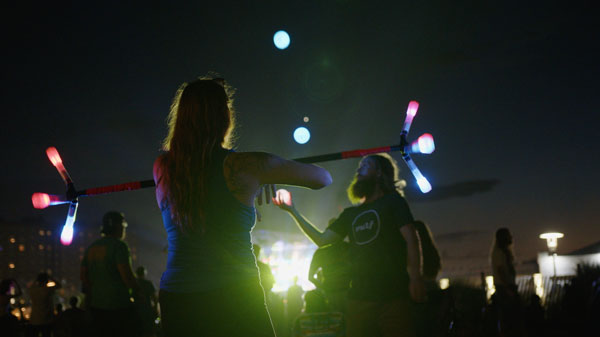
The Sun Rises in The East, directed by Tayo Giwa, has positioned itself as one of the Fall 2022 New Jersey Film Festival’s most anticipated premieres. Recruiting vintage archived photos, historians, credited authors, and school children of the 1970s, The Sun Rises in The East turns out to be an impressively well-rounded, impenetrable fortress of investigation. By streaming together vignettes of accounts, this Brooklyn-born documentary successfully takes audiences through the mythology of The East. A vague name for what represents Brooklyn’s black community’s cultural touchstone of the 1970s. Just like the best mythologies, The East’s origin story is rich in historical significance and revels in transnational vibrancy. Kwasi Konadu, author of A View from The East, dates the beginning of The East with a school named “Uhuru Sasa Shule,” which is Kiswahili for “Freedom Now School.” Uhuru Sasa Shule originated from the collective need to take back control of black people’s education from white teachers’ and administration’s lack of concern towards black school children. Moreover, the opening scene triumphantly blazons The East as “a cultural community of individuals who wanted institutions and businesses run by and founded by black people,” or put more simply, “history in the making...home, and a revolution.” What this documentary highlights is how often the making of a revolution is bred through a systematic pattern of oppression.
The directors’ voyage through America’s Civil Rights lineage is a major element chronicled in The Sun Rises in The East. The film’s heavily backed history – Brown v. Board of Education, the Freedom Day school protests of February 1964, desegregation bussing attempts, the African-American Teacher Association, the UFT teachers’ strike, etc. – richly colors and highlights exactly why something like The East had to be institutionalized. From these manifestations of oppression, The East was officially founded between the union of the African American Students’ Association and Jitu Weusi in 1969. Alas a place where black people did not have to endure being treated less-than-human existed for Brooklynites.
Viewers can also expect the documentary’s indulgence in highlighting the school’s educational ideologies. Apart from The East’s placed importance on black American history and the African diaspora as the baseline curriculum, Jitu Weusi and co-founder, Adeyemi Bandele, further talk in depth of the institution’s musical and artistic significance. Not only did The East exclusively work to educate black children of their history, but it also honored the critical importance of artistry. For the first time ever, there was now a space for black people to learn, connect with their community, and express themselves through the arts and music.
Moreover, the tentacles of The East and its black power agenda exceed far wider than many would expect. In the documentary, a handful of members from The East recall the institution’s many black-owned offshoots – the Sweet East Restaurant, East Kitchen and Caterers, Black News Newspaper, East Publishers, East Records, Akiba Mkuu Bookstore, East Jazz Club etc. – aimed towards gathering and curating a society apart from white-owned New York. Yet, the systemic aversion to The East – led by the likes of Mayor Ed Koch and the NYPD – ultimately led to the decline and end of the institution. By 1986, The East was forced to relinquish Uhuru Sasa Shule, the heart of the school. Mark Winston Griffith, executive director of Brooklyn Movement Center quips, “was it able to bring us to the Promised Land? No, of course not...Did it take us a few steps towards that, and our liberation? Hell yes.” The East was just the beginning of the trek towards the Promised Land. What the documentary makes apparent is how the children and members of The East are at the heart of what is keeping its legacy alive, beating and reverberating throughout the streets of Brooklyn to this day.
In The Sun Rises in The East, the lasting effects of The East send echoes as we watch a Central Brooklyn pedestrian plaza be retitled “Jitu Weusi Plaza” in July of 2021. One of the documentary’s most touching moments is the ceremony debuting the newly named plaza featuring evocative accounts from Weusi’ past students, all grown up now, smiling in agreement. It’s no doubt the emotional and cultural impact Weusi had on Brooklyn’s black community. One could say Weusi’s offering has transformed his image from a passionate, humble leader to, post death, a divine, god-like entity that awakened Brooklyn’s idea of black power forever. It is now in our hands to continue educating, voicing, and advocating for the continuation of Weusi’s vision. What viewers alike can do to push this culturally relevant narrative forward is keep learning and acknowledging the importance of this documentary, and make sure to buy tickets to The Sun Rises in The East’s state premiere coming to the New Jersey Film Festival on September 9th. The film will be online for 24 Hours and in-person at 7PM in Voorhees Hall #105/Rutgers University, 71 Hamilton Street, New Brunswick, New Jersey. Director Tayo Giwa will be doing a Q+A after the in-person screening.
Go here for more info and tickets: https://watch.eventive.org/newjerseyfilmfestivalfall2022









